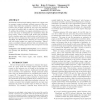Free Online Productivity Tools
i2Speak
i2Symbol
i2OCR
iTex2Img
iWeb2Print
iWeb2Shot
i2Type
iPdf2Split
iPdf2Merge
i2Bopomofo
i2Arabic
i2Style
i2Image
i2PDF
iLatex2Rtf
Sci2ools
115
click to vote
SIGIR
2006
ACM
2006
ACM
Topical link analysis for web search
Traditional web link-based ranking schemes use a single score to measure a page’s authority without concern of the community from which that authority is derived. As a result, a resource that is highly popular for one topic may dominate the results of another topic in which it is less authoritative. To address this problem, we suggest calculating a score vector for each page to distinguish the contribution from different topics, using a random walk model that probabilistically combines page topic distribution and link structure. We show how to incorporate the topical model within both PageRank and HITS without affecting the overall property and still render insight into topic-level transition. Experiments on multiple datasets indicate that our technique outperforms other ranking approaches that incorporate textual analysis. Categories and Subject Descriptors: H.3.3 [Information Storage and Retrieval]: Information Search and Retrieval General Terms: Algorithms, Performance
Related Content
| Added | 14 Jun 2010 |
| Updated | 14 Jun 2010 |
| Type | Conference |
| Year | 2006 |
| Where | SIGIR |
| Authors | Lan Nie, Brian D. Davison, Xiaoguang Qi |
Comments (0)

